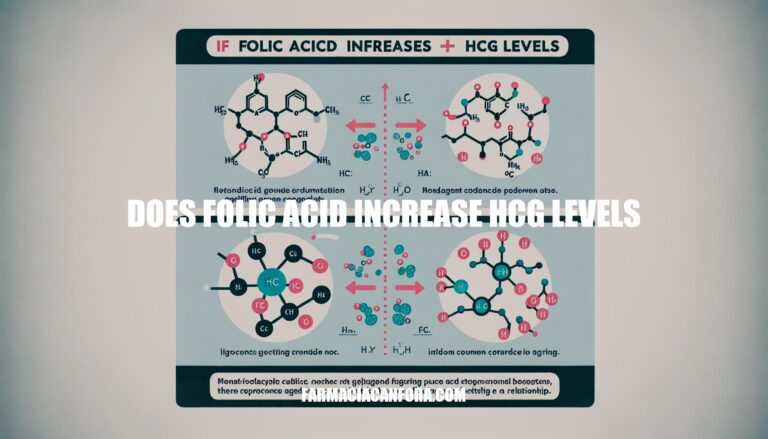


Folic acid, a synthetic form of folate (vitamin B9), is crucial during pregnancy for preventing neural tube defects and supporting overall fetal development. Human chorionic gonadotropin (hCG) is a hormone produced by the placenta that is essential for maintaining pregnancy.
The question of whether folic acid increases hCG levels is important because understanding this relationship can help optimize prenatal care. However, current research indicates that folic acid does not directly increase hCG levels. Instead, hCG levels are primarily influenced by the placenta and the stage of pregnancy.
Understanding these dynamics ensures that pregnant individuals receive appropriate guidance on supplement use and monitoring of hCG levels for a healthy pregnancy.
Let’s dive into the biological roles of folic acid and hCG.
Folic acid, also known as vitamin B9, is crucial for the body’s ability to make new cells. It plays a key role in DNA synthesis, repair, and methylation, as well as in the production of red blood cells. During pregnancy, folic acid is especially important because it helps form the neural tube, which becomes the baby’s brain and spinal cord. Adequate folic acid intake before and during early pregnancy can significantly reduce the risk of neural tube defects, such as spina bifida.
Human chorionic gonadotropin (hCG) is a hormone produced by the placenta shortly after implantation. It has several critical functions during pregnancy:
Both folic acid and hCG play vital roles in ensuring a healthy pregnancy and the proper development of the fetus.
Current scientific research indicates that folic acid does not influence hCG (human chorionic gonadotropin) levels. Key studies have consistently shown no significant correlation between folic acid supplementation and changes in hCG levels during pregnancy.
For example, a study published in BMC Research Notes analyzed the effects of folic acid supplementation on various pregnancy outcomes and found no impact on hCG levels. Another review in the Journal of Biomedical Science also concluded that folic acid intake does not alter hCG levels.
In summary, existing evidence supports that folic acid does not affect hCG levels.
Taking folic acid during pregnancy is crucial for several reasons, even though it doesn’t affect hCG levels. Here are the practical implications:
Prevention of Neural Tube Defects (NTDs): Folic acid is essential for the proper development of the baby’s neural tube, which forms the brain and spinal cord. Adequate intake significantly reduces the risk of NTDs like spina bifida and anencephaly.
DNA Synthesis and Cell Growth: Folic acid plays a vital role in DNA synthesis and cell division, which are critical processes during the rapid growth and development of the fetus.
Reduction of Homocysteine Levels: Elevated homocysteine levels are associated with pregnancy complications such as preeclampsia. Folic acid helps lower these levels, thereby reducing the risk.
Overall Maternal Health: Adequate folic acid intake supports the mother’s health by preventing megaloblastic anemia, a condition that can cause severe fatigue and other health issues.
Despite its lack of effect on hCG levels, folic acid’s role in preventing birth defects and supporting both maternal and fetal health makes it an indispensable part of prenatal care.
Folic acid is essential during pregnancy to prevent neural tube defects and support fetal development, but it does not directly increase human chorionic gonadotropin (hCG) levels. hCG levels are primarily influenced by the placenta and stage of pregnancy.
Folic acid plays a crucial role in DNA synthesis, cell growth, and reducing homocysteine levels, making it indispensable for prenatal care despite its lack of effect on hCG levels.